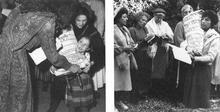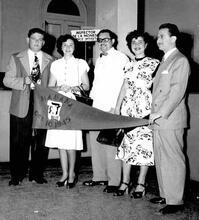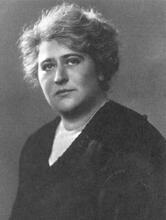Cecilia Razovsky
Cecilia Razovsky found countless ways to help Jewish refugees, from writing plays and pamphlets that changed public opinion to running numerous committees and organizations for immigrant aid. She began working on immigration issues for the National Council of Jewish Women (NCJW) and was an official delegate at the International Conference for the Protection of Migrants in Geneva. She later served in leadership roles for the National Coordinating Committee for Aid to Refugees and Immigrants from Germany, the German-Jewish Children’s Aid, and the General Committee of Immigrant Aid at Ellis Island and New York Harbor. Throughout her career, Razovsky published studies on Jewish refugees in North and South America, edited NCJW’s periodical The Immigrant, and wrote articles, plays and pamphlets that shaped American opinions of immigrants.
Article
Cecilia Razovsky was a remarkably active woman who spent her life striving to assist immigrants in adapting to life in the United States and other countries. This interest in immigrant issues motivated her involvement in the National Council of Jewish Women (NCJW) and a variety of other organizations.
Razovsky was born on May 4, 1891, in St. Louis, Missouri, to Jonas and Minna (Meyerson) Razovsky. She received her education from Washington University, St. Louis (1911), the Corliss School of Law (1912), the St. Louis School of Economics (1913), and the Chicago School of Civics and Philanthropy (1919). She also pursued graduate work in sociology at the University of Chicago. Razovsky worked as a legal secretary in St. Louis from 1909 to 1911. From 1911 to 1917, she taught English to foreigners in the public evening schools. In 1917, she moved to Washington, D.C., to become an inspector in the child labor division of the United States Children’s Bureau, a post she filled until 1920. In 1927, Razovsky married Dr. Morris Davidson, and the couple had one son, David L. Davidson.
Razovsky performed important work for the National Council of Jewish Women and was very active in that organization, serving on the national board throughout the 1930s. She served as secretary for the immigrant aid department from 1920 to 1932 and became associate director in 1932. In 1923, Razovsky represented the NCJW at the World Conference of Jewish Women in Vienna and spoke on immigration restriction in the United States.
Her interest in immigration issues influenced her involvement in other organizations as well, including posts in the National Conference of Social Work from 1926 to 1929. She was chair of the Conference on Immigration Policy in 1928. The following year, she was the official delegate, representing ten national American organizations at the International Conference for Protection of Migrants in Geneva. She became the executive director of the National Coordinating Committee for Aid to Refugees and Emigrants coming from Germany, and executive secretary of German-Jewish Children’s Aid in 1934. She was a member of a committee on contact with Jewish communal agencies and the committee for social work for aliens at the International Conference on Social Work, held at Frankfurt-am-Main, Germany, in 1932. In 1933, she was chair of a committee of twelve specialists appointed by Secretary of Labor Frances Perkins to advise the Committee of Forty-Eight on conditions at Ellis Island and other ports. She served on the General Committee of Immigrant Aid at Ellis Island and New York Harbor, both as chair, from 1933 to 1936, and as secretary, in 1937. Throughout this period, she conducted a number of studies on the lives of Jewish refugees, including studies of conditions in European port cities (1923, 1935), Cuba (1924), Mexico (1926, 1930), Canada (1926), and Brazil and Argentina (1937).
Razovsky was the editor of the NCJW publication The Immigrant from 1922 to 1930. She wrote a number of articles, plays, and pamphlets on immigration and conditions of Jews in Latin America, including Handicaps in Naturalization, which influenced Congress to reduce naturalization fees. Other publications, which were prepared for the NCJW, include What Every Emigrant Should Know (1922), What Every Woman Should Know About Citizenship (1926), and Making Americans (1938).
Selected works by Cecilia Razovsky:
Handicaps in Naturalization (1932).
Making Americans (1938).
What Every Emigrant Should Know (1922).
What Every Woman Should Know About Citizenship (1926).
EJ; Rogow, Faith. Gone to Another Meeting: The National Council of Jewish Women, 1893–1993 (1993).
UJE.
WWIAJ (1938).






